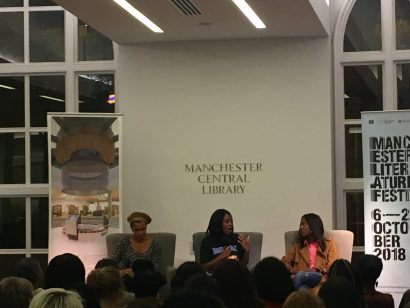 MLF Chapter & Verse
MLF Chapter & Verse
The Manchester Literature Festival Blog
Review: Slay in Your Lane: The Black Girl Bible
Our Young Digital Reporter, Alice Richardson is inspired by Yomi Adegoke and Elizabeth Uviebiené, authors of Slay in Your Lane.
With this year’s Manchester Literature festival paying homage to so many inspirational women, Yomi Adegoke and Elizabeth Uviebiené’s Slay in Your Lane: The Black Girl’s Bible is certainly a must-read body of work. Rivetingly raw and powerfully honest, this collaboration of experiences elevates the voices of black British women in the world of literature and wider media, where the dominant figures have, for so long, been white and male.
Joining acclaimed presenter, author and activist, Gemma Cairney on the stage, Yomi and Elizabeth describe their thrill at the staggering reception the book has received. With a nod to the vibrant pink cover, Yomi notes a public preconception of the book as ‘soft’ and inadequate to tackle serious issues. But as the saying goes – never judge a book by its cover. Only three months on since the book’s release, Yomi and Elizabeth reflect on the feedback they have received, citing the book as a crucial tool for discussion and an eye-opening revelation for many.
When asked, ‘why choose a book as your medium?’ Elizabeth poignantly remarks that there is something about a book that ‘validates’ your words and, in turn, preserves them for the benefit of future generations. It’s an incitement to start to ‘lean in’ and ‘put yourself out there’, says Yomi, noting that where there has been a distinct lack in the literary market for black women’s voices power is shifting: ‘There’s something taking place now in literature, something that’s more female, more black, more working class.’
Much like the book itself, the evening moves between discussions of collective social inequality and the authors’ personal experience of racism. When asked about the editing process, Elizabeth recounts an initial reluctance to make the book more personal. The book wasn’t supposed to be about us, she says. ‘We were the vessels, the middlemen’. The two agree however that it soon became apparent that their own lived experiences were crucial to the authenticity and honesty of the book.
Despite the subject matter however, the energy radiating from the women on the stage has an unshakable warmth, broken often by fits of laughter. Midway through serious discussion, Yomi turns to Elizabeth who has just taken out her phone, exclaiming in mock horror, ‘Are you Instagraming right now?’ The women’s ability to laugh in the face of adversity is noted by Yomi, who states that the book is ‘punctuated by humour’, an element she sees as a being a huge part of black culture. ‘We’re funny!’ she says. ‘It’s about seeing the light in things without making light of it.’
As the discussion broadens to wider governmental issues, Gemma asks, ‘So when are you guys going to run for prime minister then?’ Elizabeth laughs and replies, ‘We’re still learning. We don’t have all the answers’. With the foundations of the book starting out as just a conversation in 2014, to the success that it has now received, the two women note the power derived from the freedom of literature, identifying the important platform this book has given them and the fundamental need to use this power to engage the younger demographic.
When asked by a member of the audience about the women referenced in the book – ‘Where did you find these women?’ – Yomi responds simply, ‘Just a google search, it’s not hard’. In just a week she says, we discovered over 200 pioneering black British women we had never heard of before. A staggering revelation of the underrepresentation of black women in British media. As the evening draws to a close, the underpinning message is clear. It is only by speaking out about these issues, continuing these discussions and writing these books that change will come. So if you read anything this year, make sure it is this book!
